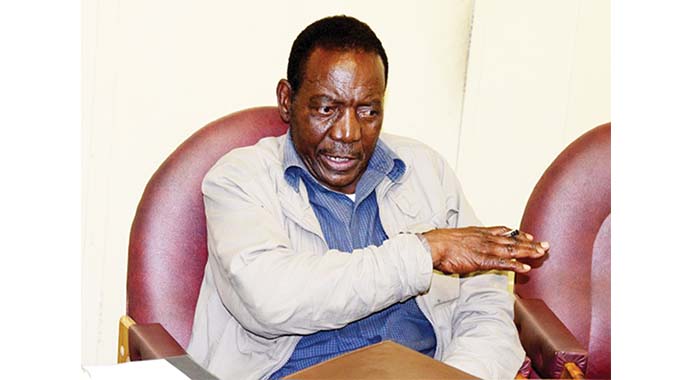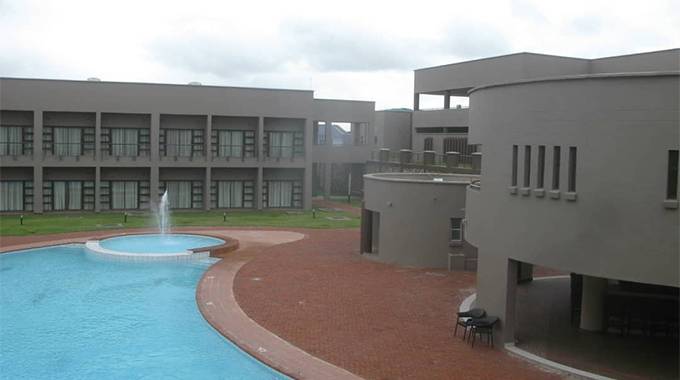Cde Stanley Nleya and liberation struggle

Today we publish excerpts from interviews done by our sister paper Sunday News with national hero Cde Stanley Nleya whose Umvukela/Chimurenga name was Elish Gagisa. In the interviews published in March 2016, Cde Nleya, who died last Tuesday, details how he rose from being a simple recruit to become one of the Zipra chief instructors, at one point seconded for attachment to the Palestine Liberation Organisation (PLO) where he was involved in combat with the Israelis. He was later to become Zipra’s deputy chief of operations.
As an instructor some of the people who went through his hands are decorated freedom fighters such as Zimbabwe Defence Forces Commander General Philip Valerio Sibanda, Todd Mpisi, Rodwell Nyika (Retired Brigadier-General Collins Moyo), former St Paul’s Assembly Point commander and frontal commander for NF1 and 2, Nicholas Nkomo.
Early Life
I was born on 26 September in 1947 in Bulilima District, Matabeleland South. I come from Masendu area, which is where I did my primary education. For my secondary schooling I went to Hope Fountain Mission on the outskirts of Bulawayo and later moved to Inyathi Mission in Bubi District. However, I abandoned my education in March 1968 when I was doing Form Four to join the armed struggle.
Joining the liberation struggle
I left with my two friends, Elias Ndlovu and Cornelius Dube. As someone who came from Plumtree area it was easy to navigate our way to the Botswana border and when we crossed, we headed for Francistown where we were later directed to a refugee camp, which was called White House.
That is where I met other comrades such as Kelly Malaba and Gedi Ndlovu (the late Retired Colonel Richard Dube). We were registered as refugees. In Botswana I also met my former teacher, Mr Finely, a white liberal from Australia who had been deported by the Rhodesian government.
We stayed in Botswana for six months after which we were flown to Zambia where on arrival we were taken to Albert Luthuli Camp, which was a facility for our colleagues from ANC’s military wing, Umkhonto WeSizwe.
Military Training
We were later moved to Morogoro in Tanzania for military training and that was in 1969. We were the third Zipra group to be trained at Morogoro. We were a group of 100 and some of the people that I trained with are now National Heroes like the late Retired Colonel Masala Sibanda and Enoch Tshangange (the late Retired Major-General Jevan Maseko). Others are Retired Brigadier-General Abel Mazinyane (pointing at him as they were together during this interview), Ben Mathe (Retired Brigadier-General Tshile Nleya) and Retired Colonel Eddie Sigoge Mlotshwa. On the instructors’ side the camp commander was Albert Nxele, the chief of staff being Retired Brigadier-General Ambrose Mutinhiri while the late General Lookout Masuku was the commissar.Under those three were people like Rogers Alfred Nikita Mangena, Gordon Munyanyi (Tapson Sibanda), Sam Fakazi, Pondayi, Stanley Tsavarai, Elliot Masengo (National Hero Retired Lt-Col Harold Chirenda) Philip Maphosa and Jordan Gampu. There were also two Egyptians who were deployed by the OAU (AU), Colonel Mustaphy and Major Mohammed. We completed our training after nine months, it was a gruelling exercise. Colonel Mustaphy used to joke and say: “I will teach you how to see,” when we were doing drills in observation.
After Training
Cde Nleya: After our training the most five outstanding recruits were chosen to be instructors and I was one of them. Others were Jevan Maseko, Tshile Nleya, Eddie Sigoge and Elias Ndlovu. We were physically fit and probably also the instructors noticed the brilliant military brain in us. So, what happened was that our instructors except for Sam Fakazi left the camp for Zambia for other tasks while we remained, taking over as new instructors. The other comrades that we had trained with also left for Zambia for deployment and other tasks as well. However, something happened that affected the wheels of the revolution in the process disturbing our training programme.
Re-organising post-Zapu Crisis
On the military side Rogers Alfred Nikita Mangena was made chief of staff as the rank of commander was reserved for the party leader Dr Joshua Nkomo who was in prison at that time. Cde Mangena only became commander when Dr Nkomo got the title of supreme commander. Then below Cde Mangena as chief of staff was Cde Lookout Masuku who was political commissar, Cde Cephas Cele came in as chief of training, Report Mphoko (Phelekezela) became chief of logistics. The chief of intelligence was Cde Gordon Munyanyi (Tapson Sibanda), who was also responsible for communications and recoinnasance. The chief of operations was Cde John Dube (JD) whose real name was Charles Ngwenya while Cde Dumiso Dabengwa was the secretary of the Revolutionary Council.
From that meeting there was also the drafting of the Proxy Document, which for the sake of this interview I will mention that it established the department of training and personnel, which I was under. The department of training was given the following tasks; maintenance of personnel records and general administration of the Zipra HQ, maintenance of discipline in the force using the Disciplinary Code, drawing a training programme for Zipra according to the strategic plan and coordinate the recruitment of personnel. It also spelt out the maintenance of personnel records of our cadres and captured enemies, co-ordinate promotions, transfers, decorations, burials etc.
Deployment to Palestine Liberation Organisation
I went to Lebanon in 1974 in the company of four others. I was the commander of that group and our mission was to get first-hand experience on how PLO was contending against Israel forces because we believed that the Rhodesians tactics were sort of similar to that of the Israel army and so we went for attachment and what an attachment it was. We also wanted to learn how PLO was going about its armed struggle. I took along the current commander of the army, Ananias Gwenzi (General Philip Valerio Sibanda), Assaf, what a brave soldier, he died in combat in 1978 a few days just before the death of Nikita Mangena, Elias Ndou and Joel Dambudzo (laughs). However, Cde Dambudzo was disqualified by the PLO because of his heavy body as they felt he could not go through the commando training course which we had to take first before being deployed along our PLO comrades in the battle field. Joel had to do other tasks. We went through that training and after that we were thrown into the fray to face the Israel army and our first day was a baptism of fire as we were bombarded with mortar bombs. We fought fierce battles there and fortunately we all returned to Zambia unscathed. I resumed my duties at Mwembeshi where I was chief of staff.
Promotion to deputy chief of staff
We got intelligence that the camp was about to be attacked by the Rhodesian forces and we decided to shift base to eMagojini. At eMagojini we set base at a camp which we gave the name Moscow. The commander of the camp which was heavily fortified with anti-air weapons was Cde Jack Mpofu. At that camp there were 3 000 trained men. We had more than nine detachments of 200 soldiers each. I did not stay long at the new camp because I was moved to Zipra HQ at Kasupe, about 10km west of Lusaka where I was given the rank of deputy chief of operations and that was in 1977.
Why Zipra deployed more fighters in Mashonaland
We had more than 13 000 guerillas operating in the country, a majority of them in Mashonaland, that is parts of Mashonaland Central especially in Guruve but the biggest contingent was in Mashonaland West. Zipra was all over Mashonaland West. Areas like Hurungwe were called Lebanon because we had driven the enemy out while some of our troops had reached Norton.
Three quarters of the Zipra guerillas operating in the country were not in Matabeleland. The reasons were political and military ones. In any war the biggest prize is the capital city, we would have been foolish to deploy more troops far away from the capital city, we had to be closer to Harare or Salisbury as it was called at that time because to us the war was going to be settled through the barrel not at the round table.
By deploying more troops in areas like Hurungwe we were creating a corridor for our regular forces to move with speed to the capital. Remember we had planned the Zero Hour Operation but I will not talk about it now, it is for another day. The other reason is that it was going to be unreasonable to deploy more troops in drought stricken areas where the population was going to struggle to feed the soldiers.
There is a lot of farming activities in Mashonaland West compared to any other province in the country. I can tell you that all those guerillas did not even one day go without a meal because of the active participation of the population in the armed struggle.
There are also big farms there and we also assisted the villagers by raiding the white farms and driving away the cattle to give them to the villagers. We looked at the size of the family, some were given five beasts while some got more.
Those cattle were the ones which were at times slaughtered for the boys. We had created a good rapport with the villagers and mind you, a number of people from Mash West had joined Zipra and were operating in their area.











Comments